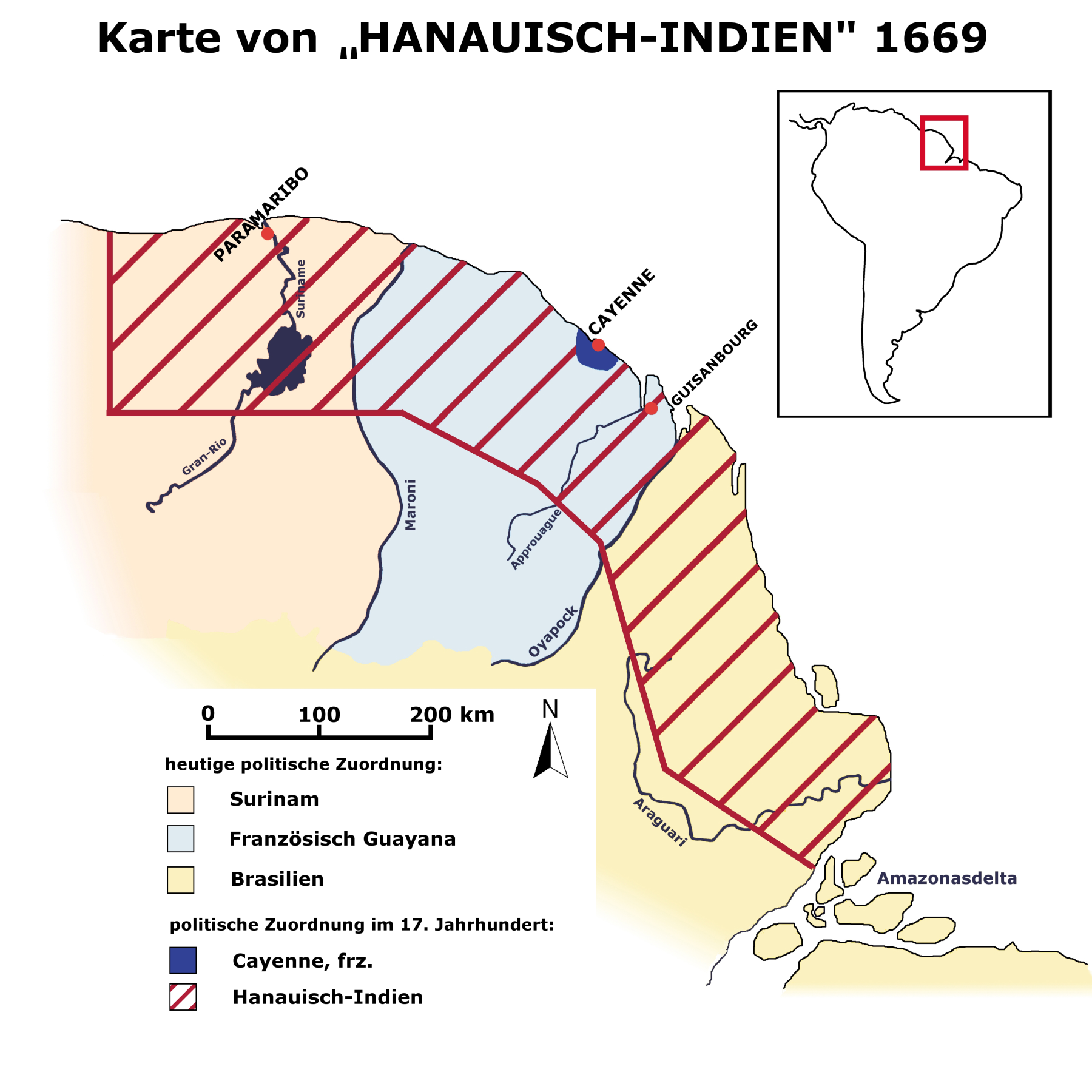Hanauish-Indies on:
[Wikipedia]
[Google]
[Amazon]
 The Hanauish Indies (''Hanauisch-Indien ''in German) was the name of a contractually agreed, but never realized, colonial project by the county of Hanau in what is now
The Hanauish Indies (''Hanauisch-Indien ''in German) was the name of a contractually agreed, but never realized, colonial project by the county of Hanau in what is now
 The Hanauish Indies (''Hanauisch-Indien ''in German) was the name of a contractually agreed, but never realized, colonial project by the county of Hanau in what is now
The Hanauish Indies (''Hanauisch-Indien ''in German) was the name of a contractually agreed, but never realized, colonial project by the county of Hanau in what is now French Guiana
French Guiana ( or ; french: link=no, Guyane ; gcr, label=French Guianese Creole, Lagwiyann ) is an overseas departments and regions of France, overseas department/region and single territorial collectivity of France on the northern Atlantic ...
, Suriname
Suriname (; srn, Sranankondre or ), officially the Republic of Suriname ( nl, Republiek Suriname , srn, Ripolik fu Sranan), is a country on the northeastern Atlantic coast of South America. It is bordered by the Atlantic Ocean to the north ...
and northern Brazil
Brazil ( pt, Brasil; ), officially the Federative Republic of Brazil (Portuguese: ), is the largest country in both South America and Latin America. At and with over 217 million people, Brazil is the world's fifth-largest country by area ...
.
In July 1669, on behalf of Friedrich Casimir of Hanau in Amsterdam
Amsterdam ( , , , lit. ''The Dam on the River Amstel'') is the Capital of the Netherlands, capital and Municipalities of the Netherlands, most populous city of the Netherlands, with The Hague being the seat of government. It has a population ...
, the Hanau Privy Councilor Johann Joachim Becher
Johann Joachim Becher (; 6 May 1635 – October 1682) was a German physician, alchemist, precursor of chemistry, scholar and adventurer, best known for his development of the phlogiston theory of combustion, and his advancement of Austrian cameral ...
signed a contract with the Dutch West India Company
The Dutch West India Company ( nl, Geoctrooieerde Westindische Compagnie, ''WIC'' or ''GWC''; ; en, Chartered West India Company) was a chartered company of Dutch merchants as well as foreign investors. Among its founders was Willem Usselincx ( ...
to take an area of 3,000 square miles (100,000 km²) from it as a fief
A fief (; la, feudum) was a central element in medieval contracts based on feudal law. It consisted of a form of property holding or other rights granted by an Lord, overlord to a vassal, who held it in fealty or "in fee" in return for a for ...
. The aim was to achieve a positive trade balance with a colony in order to compensate for the financial problems of the County of Hanau (mercantilism
Mercantilism is an economic policy that is designed to maximize the exports and minimize the imports for an economy. It promotes imperialism, colonialism, tariffs and subsidies on traded goods to achieve that goal. The policy aims to reduce a ...
). The plan was to found the ''Kingdom of Hanaui India'' there and to make the Native Indians into a "friendly and civilized" people. The contract provided for extensive rights for the Dutch West India Company, such as a transport monopoly
A monopoly (from Greek language, Greek el, μόνος, mónos, single, alone, label=none and el, πωλεῖν, pōleîn, to sell, label=none), as described by Irving Fisher, is a market with the "absence of competition", creating a situati ...
for traffic with the colony.
The area of the planned colony was by far larger than the county of Hanau itself which had an area of 44 square miles (1,500 km²) . From the beginning there was a lack of opportunities to fund such a project and there was a lack of colonists. The project ended in a financial fiasco for the county of Hanau. An attempt to sell it to the King of England
England is a country that is part of the United Kingdom. It shares land borders with Wales to its west and Scotland to its north. The Irish Sea lies northwest and the Celtic Sea to the southwest. It is separated from continental Europe b ...
in 1672 did not meet with approval. The project finally failed with the beginning of the Franco-Dutch War
The Franco-Dutch War, also known as the Dutch War (french: Guerre de Hollande; nl, Hollandse Oorlog), was fought between France and the Dutch Republic, supported by its allies the Holy Roman Empire, Spain, Brandenburg-Prussia and Denmark-Nor ...
in the same year.
See also
*German colonization of the Americas
German attempts at the colonization of the Americas consisted of German Venezuela (german: Klein-Venedig, also german: Welser-Kolonie), St. Thomas and Crab Island in the 16th and 17th centuries.
History
Klein-Venedig
''Klein-Venedig'' ( ...
References
{{Reflist European colonization of South America